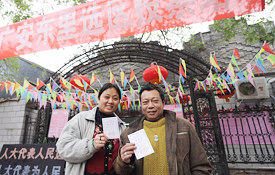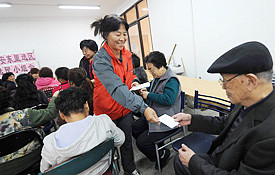 |
 |
|
READY TO VOTE: Sun Donghua (left) and Li Longquan, with ballots in hand, are about to enter a polling station in East Guang'an Constituency in Beijing's Xicheng District on November 8 (LUO XIAOGUANG) |
PRE-ELECTION WORK: Chen Guixiang, head of a voter group, issues voting certificates in the East Guang'an Constituency in Beijing's Xicheng District on October 28 (LUO XIAOGUANG) |
Liu Zihan, a high school senior in Beijing celebrated his 18th birthday on November 8 in a special way. His birthday coincided with elections to lawmaking people's congresses in Beijing's districts, counties and townships and Liu cast the first ballot of his life at a polling station in the Financial Street No.5 Constituency in Xicheng District.
"I didn't expect to be able to exercise my right to vote on the first day I became eligible," Liu said.
China's Constitution and Electoral Law stipulate that any Chinese citizen over 18 years old has the right to vote and be elected, regardless of ethnic origin, race, gender, occupation, family background, religion, education, wealth and length of residence, except for those deprived of political rights according to law.
Elections of people's congresses at different levels are held once every five years. Official statistics show that on November 8, nearly 9 million voters in Beijing went to polls.
According to the Constitution, deputies to the people's congresses of counties (including cities without districts and districts directly under cities) and townships are elected directly by the people, while deputies to the National People's Congress (NPC), China's top legislature, and provincial-level people's congresses are elected by people's congresses at a lower level.
The ongoing elections of county- and township-level people's congresses are expected to be completed by the end of next year and so far, elections have been held in China's 26 provinces, autonomous regions and municipalities.
"More than 900 million voters at the county level and more than 600 million voters at the township level will elect more than 2 million lawmakers of more than 2,000 counties and 30,000 plus townships," said He Yihui, Vice Secretary General of the NPC Standing Committee.
In March 2010, the amended Electoral Law of China went into force.
The new Electoral Law differs from the previous legislation as it grants equal representation in legislative bodies to rural and urban residents. Previously, each rural people's congress deputy represented four times as many people as an urban deputy.
"The situations in those provinces, autonomous regions and municipalities where the elections are about to conclude indicate that the Electoral Law has been implemented well, and people's rights to information, participation, expression and supervision have been respected and their voting rights have been guaranteed," He said.
According to the law, voters must register with their constituencies, and election committees will verify their eligibility and issue them voting certificates. A citizen can choose to vote in the constituency where he or she resides or works.
"To make sure that voters are registered correctly, without being left out or double counted, election committees not only wait for voters to register with them, but also visit communities and work places to register voters. They set up registration stations and use diversified channels such as TV, radio and the Internet to encourage voters to register," said a spokesman of the Legal Affairs Commission of the NPC Standing Committee.
| 